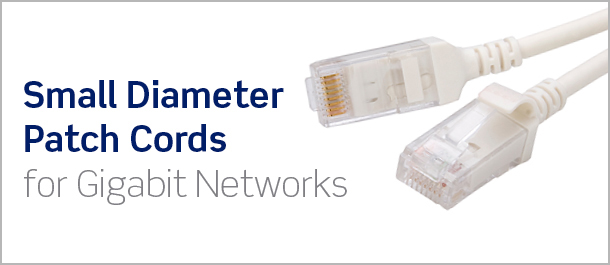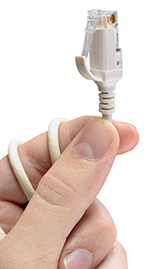Small Diameter Patch Cords for Gigabit Networks

Copper patch cords with a smaller outside diameter (OD) offer big advantages in commercial networks. However, they do come with some limitations, and these limitations need to be understood by consultants, design professionals, and building owners in order to maintain the best network performance.
Common applications for the small OD patch cords include data center interconnects, both for end-of-row (EoR) and top-of-rack (ToR) installations. They can also alleviate congestion and improve airflow in high-density areas such as telecom rooms and equipment rooms in hospitals, hotels, government, data centers, and other large facilities. And since the cords support PoE+, they can be used to power IP cameras, VoIP devices, and AV equipment in addition to carrying data to these end devices.
However, in order to meet requirements for category ratings per ANSI/TIA 568-C.2, patch cords must be constructed with four balanced twisted pairs of 22 AWG to 26 AWG, but smaller OD cords on the market today are between 27-28 AWG. Also, the standard specifies that the conductor diameter with insulation needs to be between 0.032"- 0.035", and most of the small OD patch cords are on the very low (marginally compliant) end of this range.
In addition, ANSI/TIA 568-C.2 specifies a channel length of 100 meters, which includes 10 meters of patch cords. When using the small OD patch cords, total channel length is limited to about 98 meters. If using the 10 meters of patch cords recognized by TIA standards, total channel length is reduced to 93 meters. Therefore, these patch cords cannot be true category compliant cords, by definition.
You must weigh the benefits and limitations when using these cords to ensure the value of tighter bend radius, reduced cable fill, and better airflow outweigh the shortened permanent link and channel length limitations. Remember, a permanent link includes patch cords, so installing small OD cords into a channel when not part of the intended design may lead to reduced performance of the network.

Leviton High-Flex HD6 Patch Cords
Leviton introduced high-flex small OD patch cords back in 2010, and since then they have been adopted for use in data center applications. Leviton HD6 cords are an effective solution for data centers that have maximized the capacity of their cable management systems, have limited space in their cabinets, or minimal clearance for cable bend radius. The cords allow better airflow to active equipment in panels and racks by reducing the size of cable bundles.
While these cords do not meet every parameter for a TIA category rating, they offer similar electrical performance to category-rated cords, but with higher attenuation leading to the need for shorter channels; mentioned above. They also support all IEEE requirements for delivering 1G Ethernet performance. Leviton has verified that the normal application for the cords can be a substitution for CAT 6 or CAT 5e cords in 1 Gigabyte Ethernet installations. The most concise way to mark and identify these cords is to call them IEEE 802.3 1G application grade cords.
High-Flex HD6 Patch Cords, At-A-Glance
- Small 0.15" OD is a 31% reduction in cable OD compared to typical CAT 6 patch cords made from 24-AWG conductor cable
- Twice the cable capacity in pathways and cable management systems
- Reduces the bend radius requirements from approximately 1" for typical CAT 6 patch cords to only 0.60", improving cable installation and routing in confined equipment cabinets and racks
- A 50% reduction in cable weight improves handling and strain relief, and reduces transportation costs
- They are IEEE 802.3 1GbE compliant and are qualified to IEEE 802.3at POE+ requirements to support power requirements of devices such as wireless access points (WAP)
Learn more at www.leviton.com/HD6
Note: Leviton also offers standard and SlimLine boot cords.


